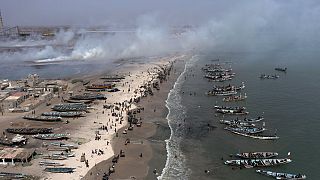Protect our Oceans
Fisheries and climate change pose major threats to the health of the oceans says Lucy Woodall, associate professor of marine conservation biology and policy, University of Exeter, and principal scientist, Nekton Foundation.
"When we look at the oceans today, we have, I think, in my mind, two clear threats," says Woodall, "and this is all global challenge of climate change. We are seeing impacts across the globe and disproportionately in countries that haven't been the emitters of greenhouse gases. But alongside that, we're seeing local impacts of fisheries. These might be unreported, unregulated or poorly regulated fisheries, which are having direct impact on the ocean. And what we know is when we have those multiple stresses that are layering up on each other, this is creating a massive impact on the ocean, how it functions and the benefits that it provides for us and the entire globe."
Average global sea surface temperatures have increased by approximately 0.13°C per decade over the past 100 years, according to the US National Oceanic and Atmospheric Administration (NOAA).
Plastic pollution is another big threat to oceans. According to the International Union for Conservation of Nature (IUCN), at least 14 million tonnes of plastic end up in the ocean every year, and plastic "makes up 80% of all marine debris found from surface waters to deep-sea sediments."
"Plastics are ubiquitous in our oceans, and they're also the ultimate sink for when plastics come from the land and into our sea," says Woodall.
"Now, this is really important for us to know because it's incredibly hard to pick it up once it's in the deep sea, in this remote, and really isolated location. So it means that instruments like the treaty that is under negotiation right now is incredibly important for today's generation, but critically for our future generations."
Last week global negotiators agreed to craft a draft treaty to end plastic pollution, a preliminary but crucial step toward tackling one of the most lasting sources of human waste.
Environmental advocates cautiously welcomed the outcome of five days of U.N. talks in Paris on plastic pollution, but expressed concern that the petroleum industry and some governments would water down the eventual treaty. Most plastic is made from fossil fuels.
Delegates at the Intergovernmental Negotiating Committee for Plastics agreed on June 3 to produce an initial draft before their next meeting in Kenya in November, participants said. The committee is charged with developing the first international, legally binding treaty on plastic pollution, on land and at sea.
Regarding this year's World Ocean Day theme , "tides are changing," Woodall says everyone will have its own interpretation of it. "For me, it's about moving from saying that's a problem and to saying whatever the solutions. To me, that feels much more empowering. It feels like something that we can do together as a global society."
Woodall is also principal scientist of the Nekton Foundation, a British scientific marine mission.











02:16
Earth Day: Fighting microfibre pollution one laundry at a time
02:02
New report finds only seven countries met world clean air standards in 2024
02:32
Several missing as Kenya tightens border security after fishermen clash
01:00
Bright red river outside Buenos Aires sparks fears of pollution
01:15
Trump signs executive order directing US withdrawal from the Paris climate agreement
02:16
Kenyan start-up turning invasive plant into biodegradable packaging